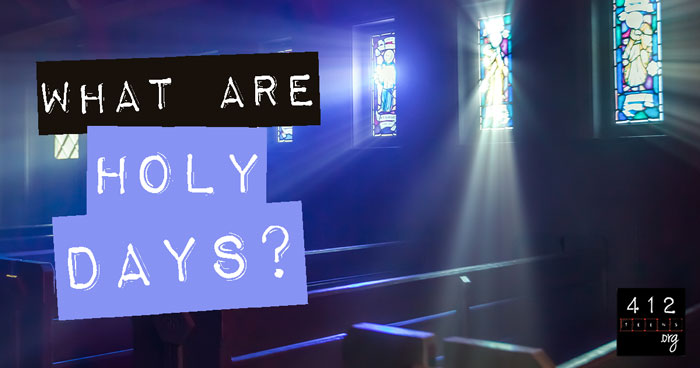What are holy days?

The term "holy day" is where we get the English word "holiday." But what exactly makes a day "holy"? Are we supposed to do specific things on holy days? Does the Bible require the observance of any particular holy days? First, let's make sure we understand the definition of "holy."
Defining Holiness
Before we can understand what holy days are, we must know what "holy" means. In the Bible, "holy" always means "set apart." We know that God is holy, good, and righteous, and, as believers, we are called to live holy lives (1 Peter 1:16). So what does this mean in reference to specific days being "holy"? Simply put, holy days have been "set apart" as times to worship and glorify God.
Holy Days in the Bible
The Bible references eight days (or spans of days) to be set apart for various remembrances and refers to these events as "festivals" or "feasts." The holy days in the Bible include:
- Passover (see Exodus 11 and 12)
- The Feast of Unleavened Bread (Leviticus 23:6-8; Numbers 28:16-25; Deuteronomy 16:1-8)
- The Feast of First Fruits (Exodus 23:16-17)
- Pentecost (a.k.a Feast of Weeks) (Leviticus 23; Acts 2:1)
- The Feasts of Trumpets (a.k.a. Rosh Hashanah) (Leviticus 23:24; Numbers 29:1-6)
- The Feast Tabernacles (a.k.a. Feast of Booths and Sukkot) (Deuteronomy 16:16)
- Purim (Esther 9:26-32)
- Day of Atonement (a.k.a. Yom Kippur) (Leviticus 23:27-28)
Most of these holy days were celebrated throughout the Old Testament and the New Testament. We can find a lot of symbolic parallels between some of these observances and the events surrounding Jesus. Just look at the circumstances of Passover! God was preparing His people to one day accept the truth of the final sacrifice that would save them from the punishment of sin.
Holy Days Observed Today
Over the centuries, various Christian churches have established new holy days as well some of the biblical ones. Today, we might refer to them as "holidays" rather than "holy days". The main Christian holidays are Christmas and Easter , then there's also Lent, Palm Sunday, Maundy Thursday, Good Friday, the Day of Pentecost, and Advent.
Should Christians celebrate holy days?
Whether Christians should celebrate holy days has been a point of debate for literally millennia. The apostle Paul wote about it in Romans 14: "One person considers one day more sacred than another; another considers every day alike. Each of them should be fully convinced in their own mind" (Romans 14:5). This means that if you choose to celebrate holy days, that's awesome. If you choose NOT to celebrate, that’s totally fine too. Whatever you decide, just make sure you are choosing that way for the right reasons (1 Corinthians 10:31).
Holy days aside, let's remember that, as believers, we are called to be holy every day (1 Peter 1:16). This means being holy in our minds, relationships, and actions. When you think of it this way, every day can be a holy day if we are setting the day apart for the Lord. As Christians, we should place God at the forefront of our minds and the center of our lives, doing our best to make every day a day that is holy.
ALSO SEE:


TL;DR
Holy days are any days that are set apart for worshipping the Lord. The Bible is filled with accounts of holy days, ranging from Passover to Pentecost. Today, Christians are not required to observe holy days, though they may freely choose to. Whether a believer chooses to celebrate an established holy day is between them and God (Romans 14:5). Since God is holy, believers are also called to live holy lives (1 Peter 1:16). This means being holy in our minds, relationships, and actions. As Christians, we should place God at the forefront of our minds and the center of our lives, doing our best to make every day a day that is holy.

Writer: Vivian Bricker
Vivian loves learning, studying the Word of God, and helping others in their walk with Christ. She is dedicated to helping people learn more about Jesus and is ready to help in any way she can. Her favorite things to do are spending time with her family and friends, cooking, drawing, and spending time outside. When she is not writing, you can find her soaking up the sunshine or going on an adventure.
